On April 23, German and French workers employed by the Continental tire company conducted a joint protest against plant closures and mass redundancies in the German city of Hannover. The jobs of around 3,000 employees are threatened by the company’s plan to close two of its factories - its German plant in Hanover-Stöcken and its Clairoix factory in northern France.
The demonstration and protest in Hanover was the first joint action to be taken by the two workforces in neighboring countries. German Conti workers cheerfully welcomed more than a thousand French colleagues who arrived early Thursday morning in Hanover in a specially chartered train from France.
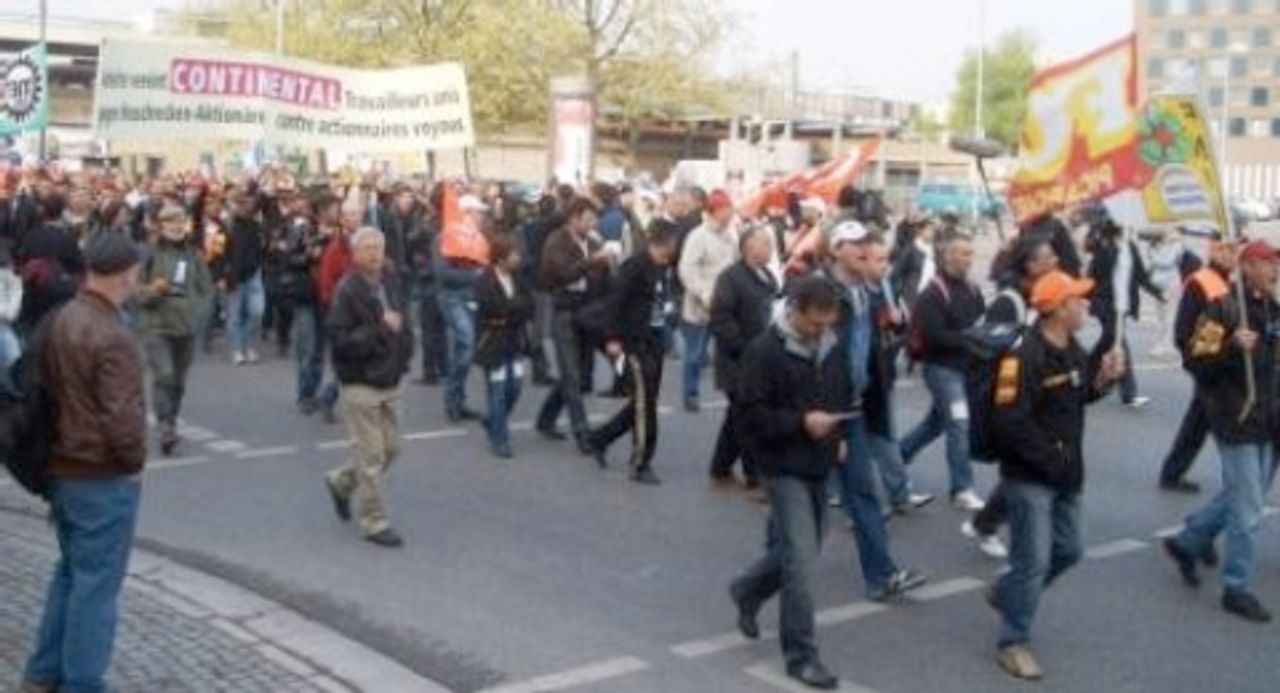 Demonstration through Hanover
Demonstration through HanoverFrench workers had traveled to Germany to conduct a protest in front of the general meeting of shareholders of Continental and the Schaeffler family concern held in the Hanover congress center on Thursday. The meeting confirmed the intentions of the company to axe at least 1,900 jobs - 1,120 in Clairoix and 780 in Hanover-Stöcken. Continental chief executive Karl Thomas Neumann told the assembled shareholders that in the current month of April almost half of its German workforce was working short time.
Since the beginning of the year, Continental has axed the jobs of 7,000 of its total worldwide workforce of 133,000, and further jobs cuts and plant closures are being prepared. Neumann openly threatened at the meeting to enforce mass redundancies when he declared that in the near future in Germany it “would no longer be possible to proceed further on the basis of short-time working”.
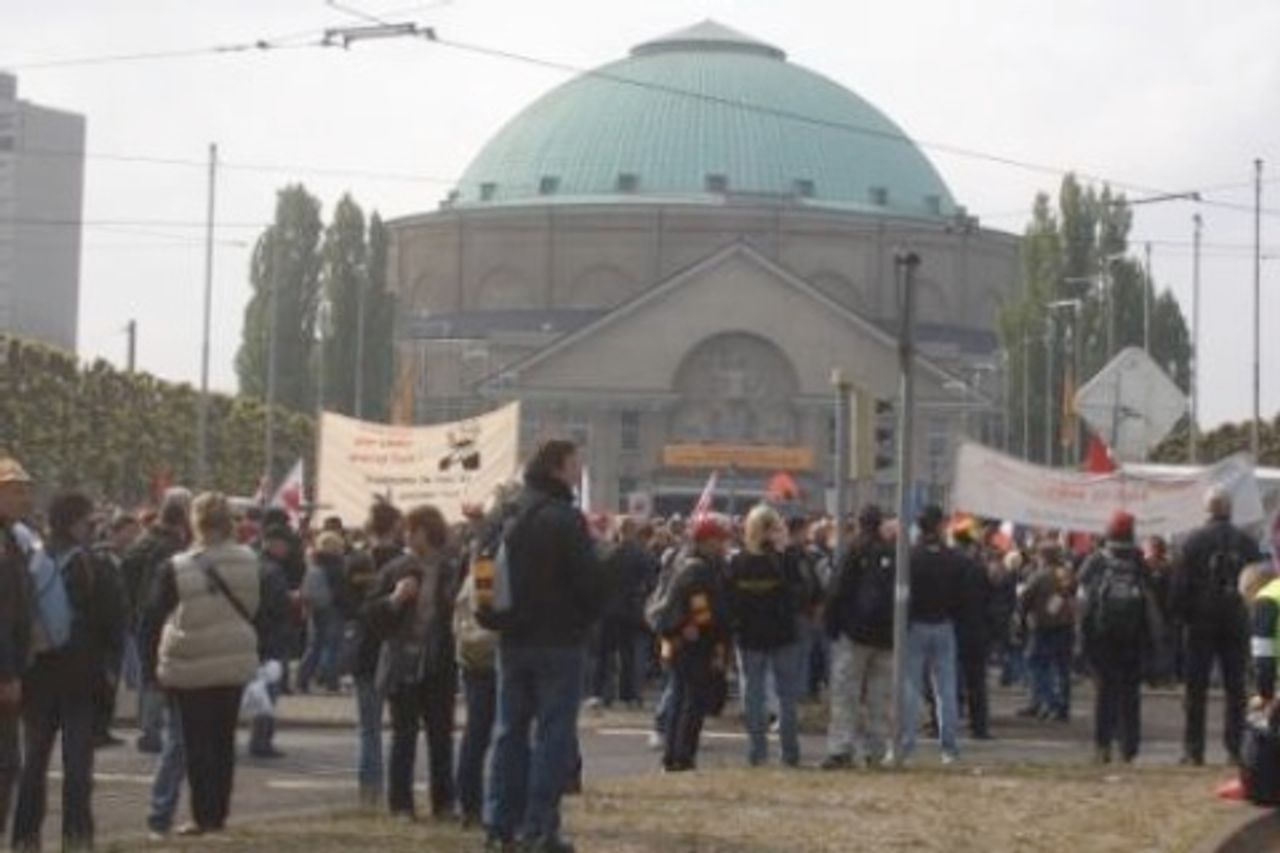 Congress center
Congress centerIn implementing its policy of massive cuts at a number of plants, the Continental management and its shareholders can rely on the close co-operation of trade union leaders. Evidently under pressure from the company’s workers, union representatives made some radical speeches at the rally on Thursday but gave no concrete commitments. The only assurance given to workers protesting in front of the congress center was the demand by building union leader Werner Bischoff (IG-BCE) that the company supervisory board, which includes union representatives, and not solely the management of the group should decide on the future fate of factories.
Bischoff, who is the deputy head of the Conti supervisory board, boasted that a few weeks ago he had worked together with the management in an “unbureaucratic and responsible” manner. “As the person responsible for contract policy I can list off completely the special condition clauses, i.e. contract concessions which all bear my signature” Bischoff conceded.
In fact no less than ten workers’ delegates sit on the Conti supervisory board in Germany, alongside Bischoff: Hartmut Meine, IG Metall district head in Lower Saxony and Saxonia-Anhalt; Jörg Köhlinger, trade union secretary for the IG Metall in Frankfurt; Hans Fischl, joint works council chairman - Automotive GmbH Regensburg; Michael Iglhaut, joint works council chairmen - Teves Frankfurt; Jörg Schönfelder, chairman of the shop stewards committee - ContiTech Korbach; etc. All of these representatives of the workforce receive handsome payment for their services, but none of them has conducted any serious struggle against the management’s closure plans.
The French trade union leaders also pursue a policy of class collaboration and carry out regular consultations with the French government.
“There have been so many concessions made from the employees’ side lately...we feel we are just being played around with,” one worker from Hanover-Stöcken told a reporting team from the World Socialist Web Site.
Like many other participants in Thursday’s protest, this worker thought it was “absolutely great” that so many colleagues had come from France. “I am struck by their determination to fight for jobs,” he said. “Now every worker must realize he is no longer just defending his own factory. All of Europe is affected,” he added.
Many of those taking part in the protest expressed interest in the WSWS articles in German and French, which were distributed by the members of the WSWS team.
German Continental workers had gathered at Hanover’s main rail station early Thursday morning to greet their French colleagues arriving in the chartered train from Clairoix.
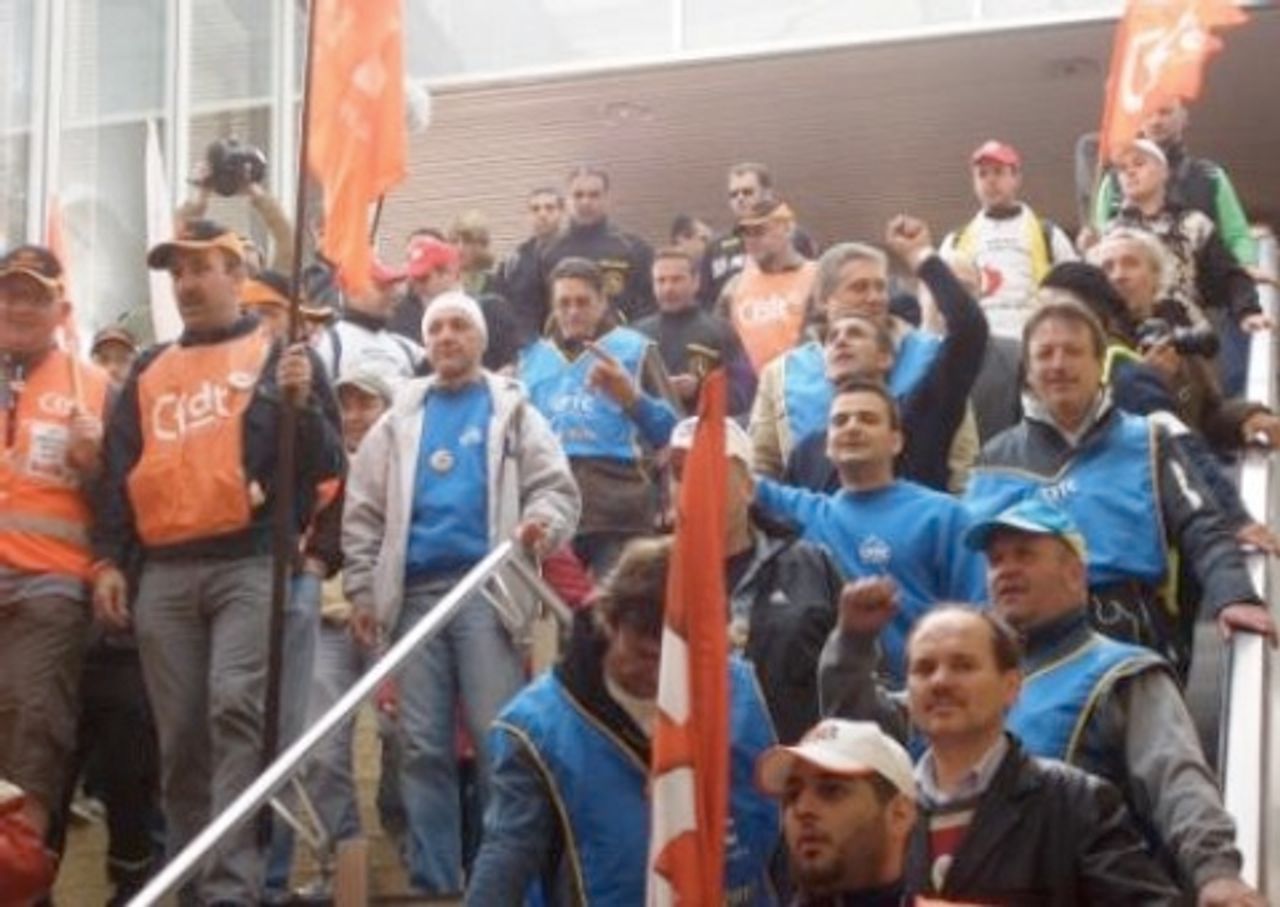 Arrival of workers from Clairoix
Arrival of workers from ClairoixThe assembled German workers carried placards in two languages declaring: “Cher collègues de Clairoix, bienvenue à Hanovre” [Dear colleagues from Clairoix, welcome to Hanover], as well as: “Proletarians of all countries, unite!” When the French contingent finally arrived, German workers took up their slogan: “Tous ensemble, Continental - solidarité”.
Although the French workers had traveled through the night, they were in good spirits and very happy to talk to the WSWS team.
Jonathan and Ludovic are two young workers from Clairoix: “This is my second year working at the factory in Clairoix, my father, however, has already worked there for 25 years”, Jonathan told us. “This is my first international demonstration. Everything is changing now; many people are beginning to wake up. In France nearly everybody has taken to the streets.
“In Compiègne we organized a demonstration of 12,000 in a small town with 60,000 inhabitants. The turnout was impressive, including the whole factory and all their relatives and acquaintances. There everything was completely peaceful. Not like it was two days ago when workers reacted with fury because we felt we had been cheated.”
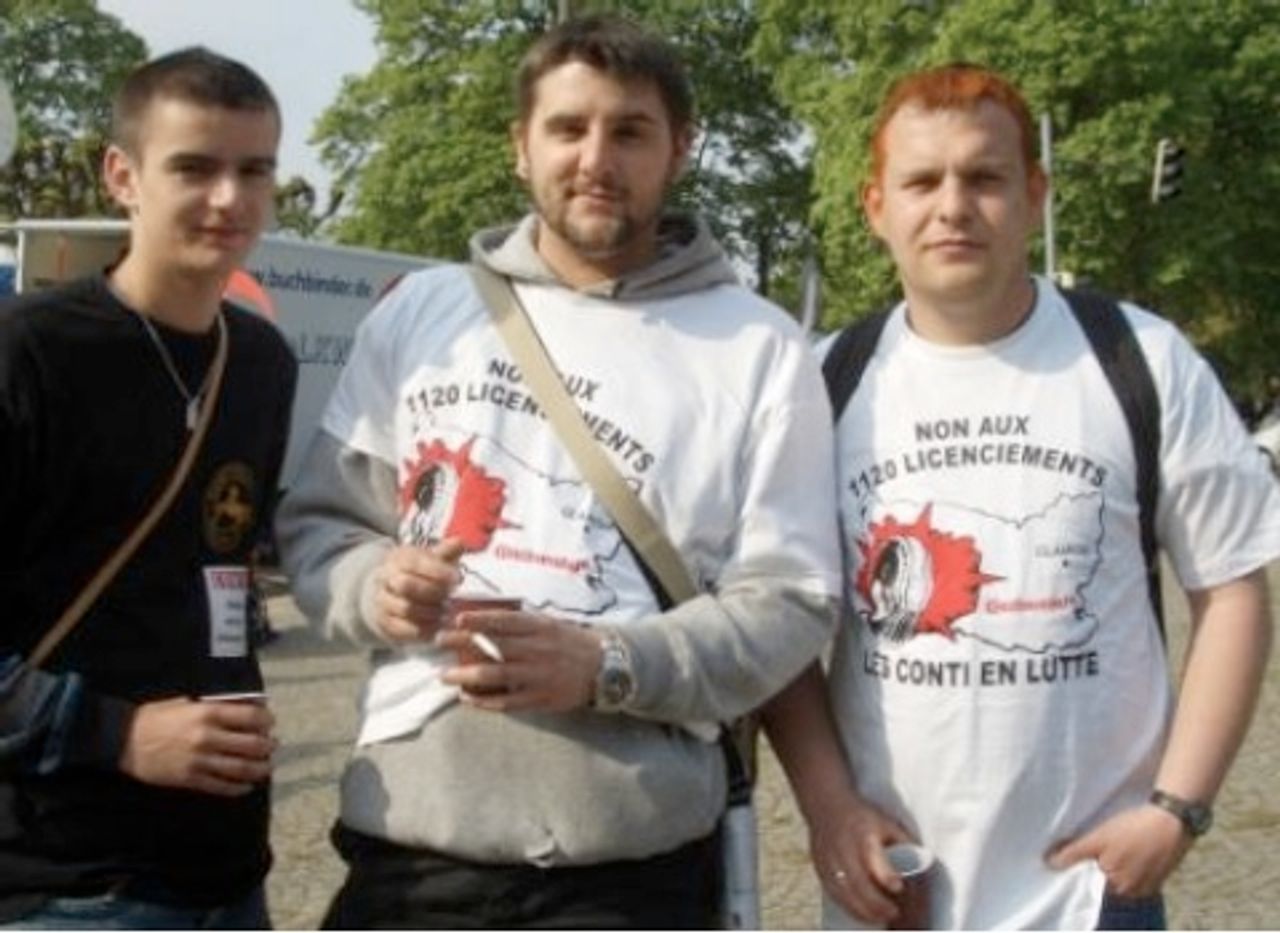 Ludovic (right) Jonathan (left)
Ludovic (right) Jonathan (left)The two young workers were alluding to events on Tuesday, when workers learned of the decision by the Tribunal de Sarreguemines, to uphold the dismissals in Clairoix. Earlier, Nicholas Sarkozy had stirred some hopes that the French government would intervene on behalf of workers; the court decision, however, sealed the closure of the factory and the dismissal of 1,120 workers. A number of workers reacted angrily and rampaged through the prefecture of Compiègne and a reception building of the factory.
René and Francis, two older workers, explained the background to this reaction: “We only learned from the press that our factory had been closed. We have been unemployed since yesterday. We lodged an appeal with the court, but on Tuesday the court decided against us. The anger was widespread; the government had cheated us completely.”
They also explained the prehistory of the dispute at their factory. In France the officially valid 35 hour week had been converted some months ago into a 40-hour week, although the workforce was opposed to the move. The trade unions had insisted on the measure in return for a promise to guarantee jobs until 2012.
Workers have now learned in a brutal fashion that this guarantee is worthless. “It is the employers who ruin everything!” René said. “Nobody wants it, but the way things are going a confrontation is inevitable.”
Eric and Jean Marie had also worked at the Clairoix factory until yesterday, Eric for eight years, and his friend for 27 years. “We were completely hoodwinked,” Jean Marie reported. “We had a firm job guarantee but its function was merely to throw sand into our eyes. It is the shareholders alone who determine what happens with the companies.” Eric added: “The shareholders are only interested in stuffing their pockets. It is clear that we do not agree with this.”
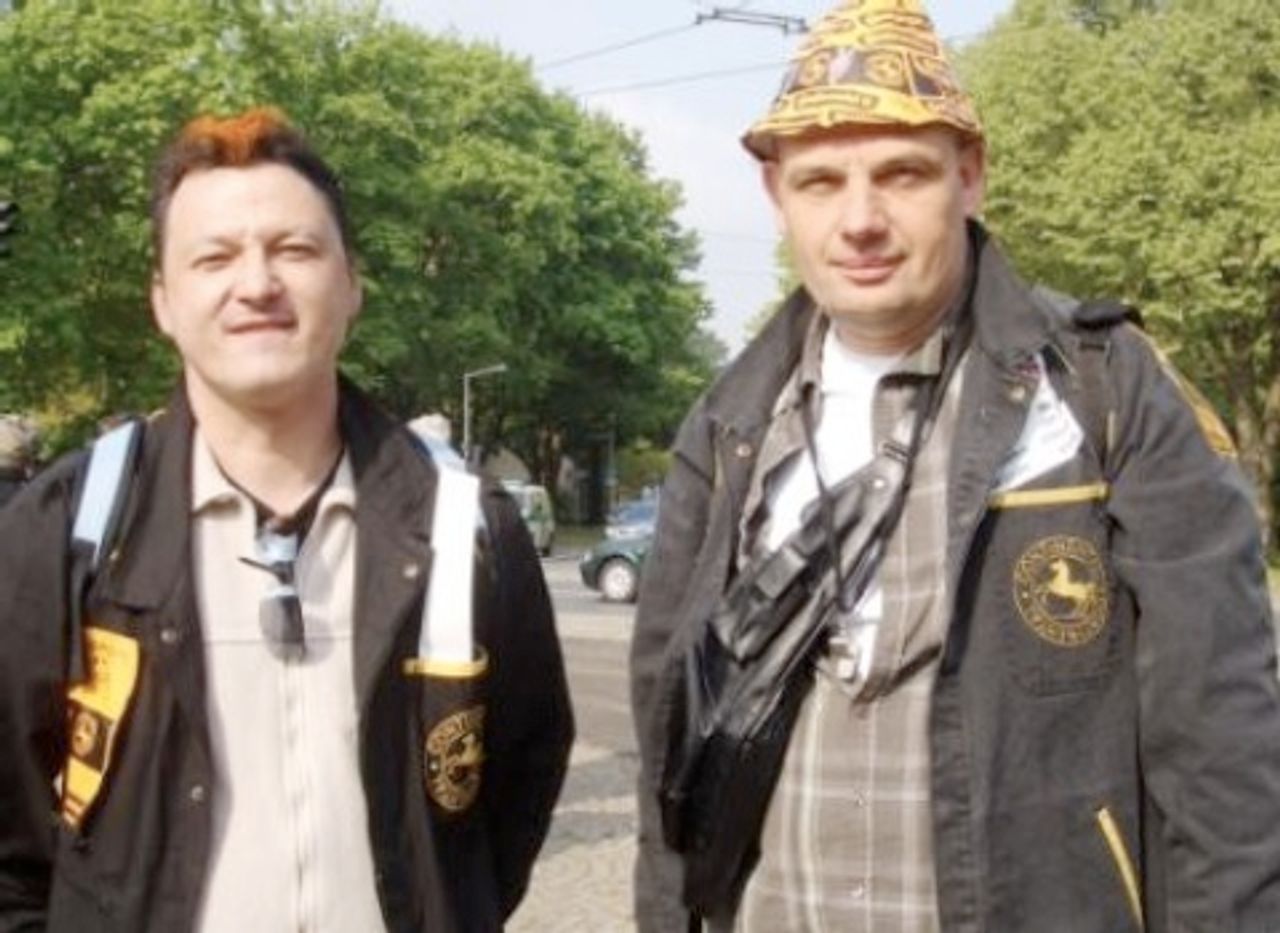 Eric and Jean Marie
Eric and Jean MarieWolfgang N. and Steffen L. work at Continental in Hanover-Stöcken.
“A whole factory is being destroyed,” Wolfgang declared, “and it is the workers who have to pay the price. Those at the top aren’t worried, they have put enough aside in their piggy banks. The capitalists shift the burden onto us; our wages are for them just expenses. But when we have no money, then who is going to buy their products?”
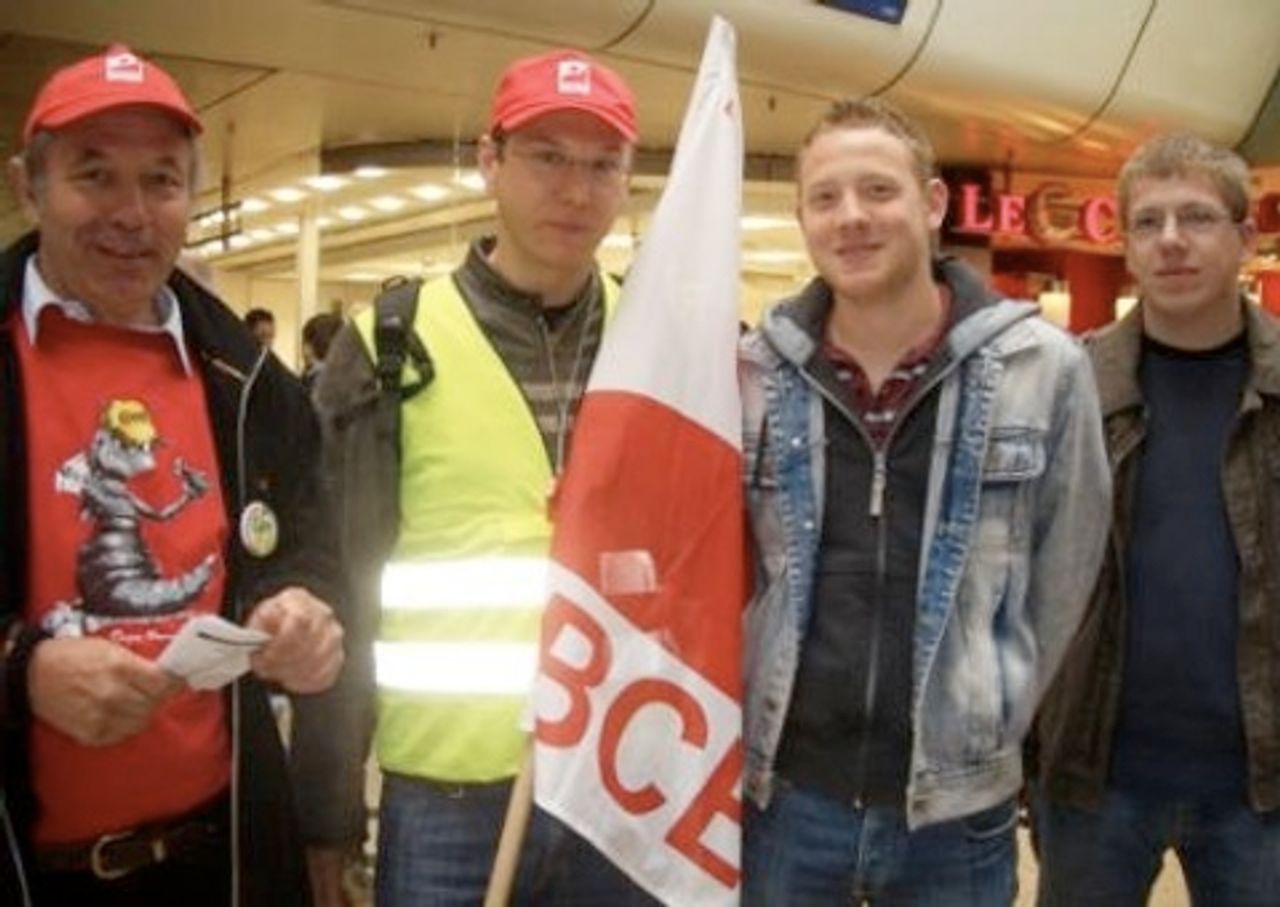 Wolfgang (left) Steffen (center)
Wolfgang (left) Steffen (center)Steffen was very pleased to see his French colleagues: “Something like this has not taken place so far, that colleagues come from France and we take to the streets together.” Steffen works as a machine-builder, but he emphasizes that “the social plan for the Conti workers also affects us. We will probably have to give up our jobs in favor of older colleagues from the truck tire manufacturing plant. We are already working short-time and spend half our time at home. A social plan - it sounds good but for us it was a big blow. The mood in the factory is at rock bottom and there is a lot of anger because the truck factory is making profits.”
Forelli and his Italian colleagues from the drive belt and traction plant in Hanover Vahrenwalderstraße have already been working short time for a number of weeks. “So far workers have only defended their interests on the basis of factory to factory, but it cannot go on like this,” Forelli declared. “Continental is playing us off one against the other and now we have to show our teeth - together.”
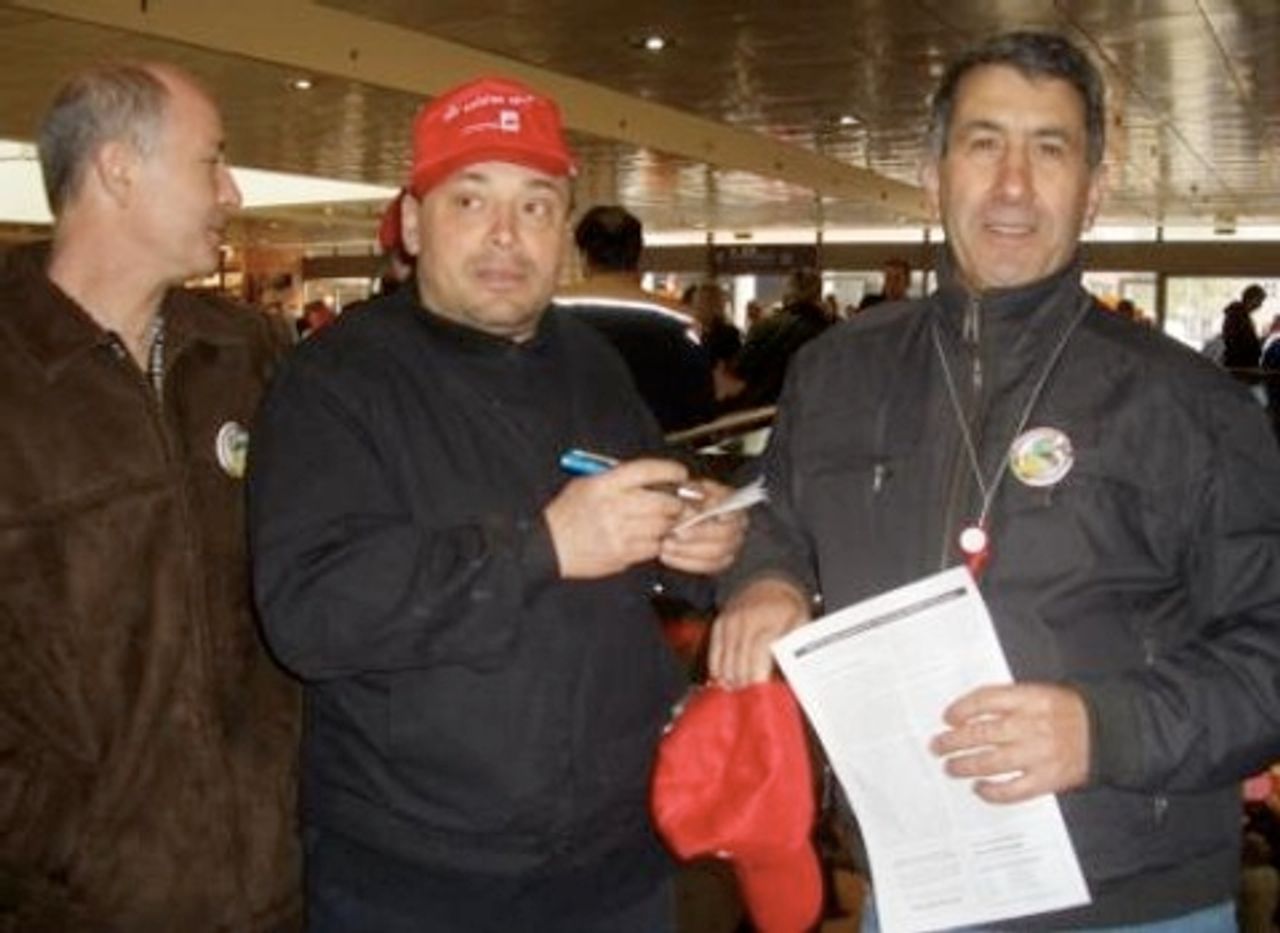 Italian workers - Forelli right
Italian workers - Forelli right